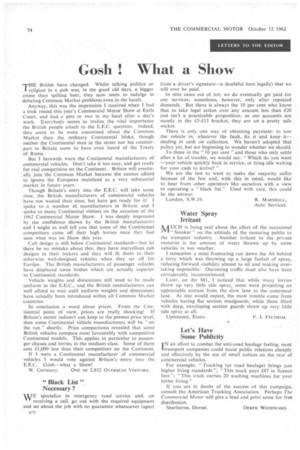Gosh ! What a Show
Page 76

If you've noticed an error in this article please click here to report it so we can fix it.
THE British have changed. Whilst talking politics or religion in a pub was, in the good old days, a bigger crime than spilling beer, they now seem to indulge in debating Common Market problems even in the locals. Anyway, this was the impression I received when I had a look round this year's Commercial Motor Show at Earls Court, and had a pint or two in my local after a day's work. Everybody seems to realize the vital importance the British people attach to the E.E.C. question. Indeed, they seem to be more concerned about the Common Market than the ordinary Continental bloke, though neither the Continental Man in the -street nor his counterpart in Britain seem to have even heard of . the Treaty of Rome.'. .
But I herewith warn the Continental manufacturers of commercial vehicles. Don't take it too easy, and get ready for real competition on the Continent. Britain will eventually join the Common Market because she cannot afford to ignore. the European mainland as a very substantial market in future years. •
Though Britain's entry into the E.E.C. will take some time, the British. manufacturers of commercial vehicles have not wasted their time, but have got ready for it! I spoke to a number of manufacturers in Britain and I spoke to many Continental visitors on the occasion of the 1962 Commercial Motor Show. I was deeply impressed by the confidence shown by the British manufacturers and I might as Well tell you that some of the Continental competitors came off their high horses once they had seen what was on Show this year.
Cab design is still below Continental standards—but let there be no .mistake about this: they have marvellous cab designs in their lockers and they will, fit them to their otherwise well-designed vehicles when they set off for Eurdpe. The British manufacturers of passenger vehicles have displayed some bodies which are actually superior to Continental standards.
Vehicle weights and dimensions still need to be made uniform in the E.E.C., and the British manufacturers can well afford to wait until uniform weights and dimensions have actually been introduced within' all Common Market countries.
In conclusion a word about prices. From the Continental point of view, prices are really Shocking! If Britain's motor industry can keep to the present.price level, then some Continental vehicle manufacturers will be on the run " shortly.Price comparisons revealed that some British vehicles compare most favourably with competitive Continental models. This applies in Particular to passenger chassis and lorries in the medium ohs's: Some of them cost £1,000 less than their competitors on the Continent.
If I were a Continental manufacturer of commercial vehicles I would vote against Britain's entry into the E.E.C. Gosh—what a Show!
W. Germany. ONE OF 2,832 OVERSEAS VISITORS.
" Black List 9 9 Necessary ?
wE specialize in emergency road service and, on " receiving a call, go out with the required equipment and set about the job with no guarantee whatsoever (apart 130
from a driver's signature—a doubtful item legally) that we will ever be paid.
In nine cases out of ten, we do eventually get paid for our services; sometimes, however, only after repeated demands. But there is always the 10 per cent who know that to take legal action over any amount less than £20 just isn't a practicable proposition; as our accounts are mostly in the £5-£15 bracket, they are on a pretty safe wicket.
There is only one way of obtaining payment: to tow the vehicle in, whatever the fault, fix it and keep it— dealing in cash on collection. We haven't adopted that policy yet, but are beginning to wonder whether vve should.
To those in the " 10 per cent" and those who only settle after a lot of trouble, we would say: "Which do you want —your vehicle quickly back in service, or lying idle waiting for your cash to arrive?"
We are the last to want to make the majority suffer because of the few and, with this in mind, would like to hear from other operators like ourselves with a view. to operating a black list:" Used with care, this could be the answer.
London, S.W.19. R. MARSHALL, Auto Services.
Water Spray Irritant
ucx is being said about the effect of the occasional lv-i" Smoker " on the attitude of the motoring public to the transport industry. Another irritant to the private motorist is the amount of water thrown up by some vehicles in wet weather.
I remember a most frustrating run down the A6 behind a lorry which was throwing up a large fantail of spray, reducing forward visibility almost to nil and making overtaking impossible. Oncoming traffic must also have been con siderably nconVenienced
Later, on the MI, I noticed that while many lorries threw -up very little side spray, some were projecting an appreciable curtain from the slow lane to the outermost lane. As one would expect, the most trouble came from vehicles having flat section mudguards, while those fitted with deep, enveloping section guards threw up very little side spray at all.
Uprninster, Essex. F. J..FELTHAM.
Let's Have Some Publicity
I N an effort to combat the anti-road haulage feeling, most transport companies could boost public relations cheaply' and effectively by the use of small notices on the rear of commercial vehicles.
For example: "Trucking (or road haulage) brings you higher living standards "; "This truck pays £87 in licence fees "; "This truck carries 20 washing machines for your better living."
If you are in doubt of the success of this campaign, consult the American Trucking Association. Perhaps The Commercial Motor will give a lead and print some for free distribution.
Sherborne, Dorset. DEREK WOODWARD.




















































































































